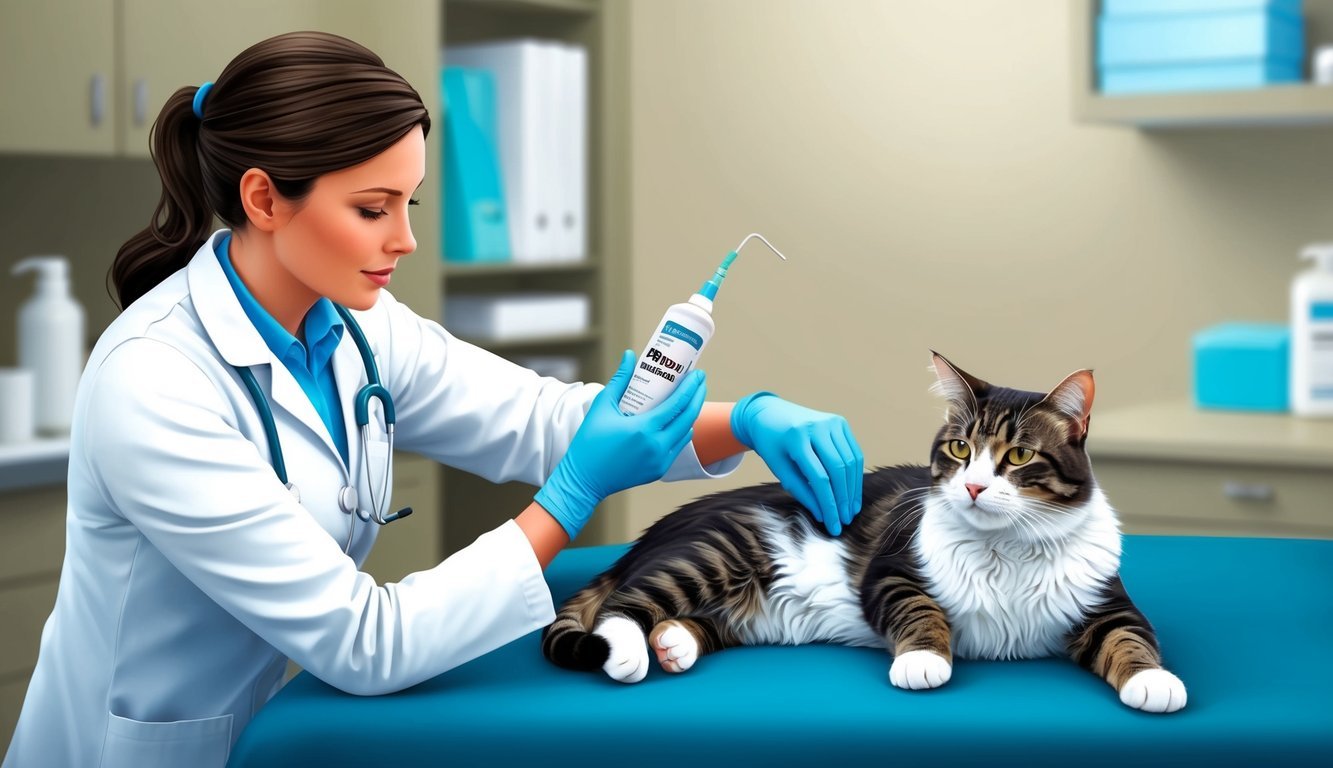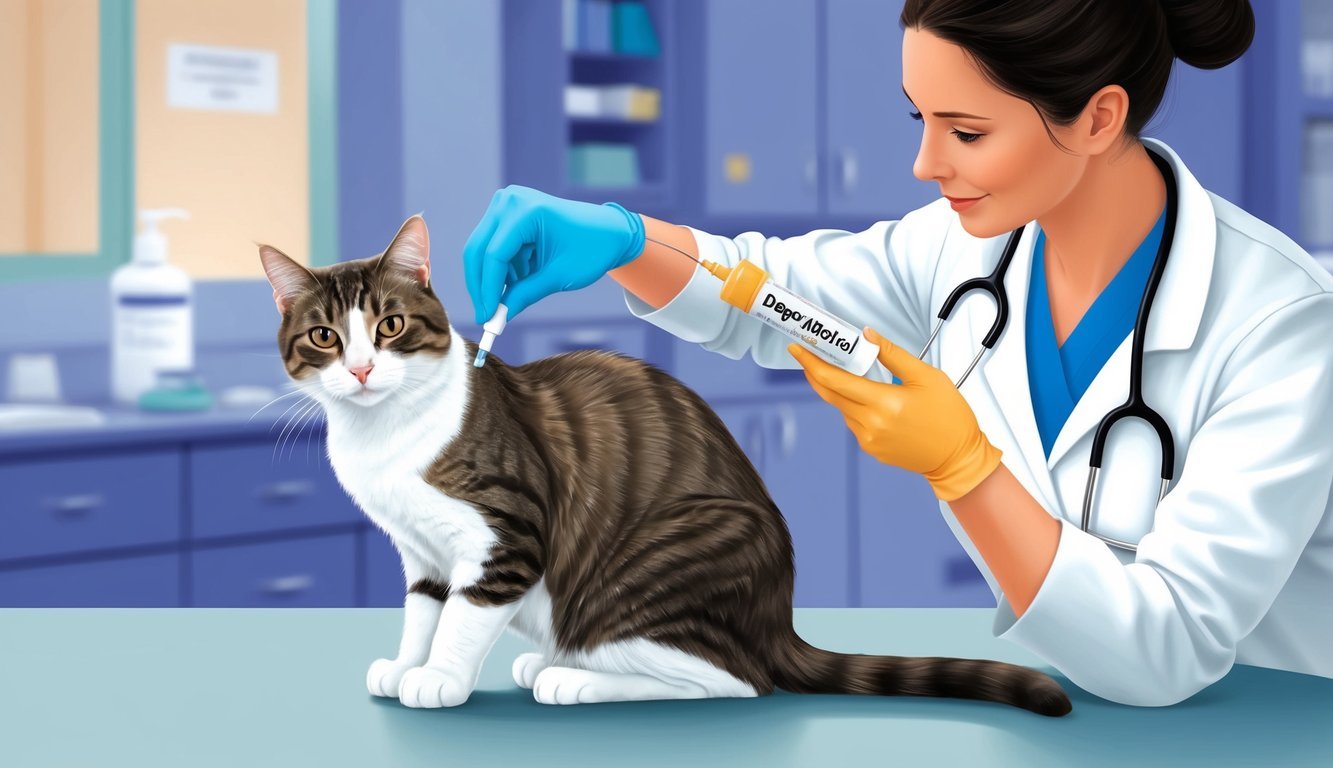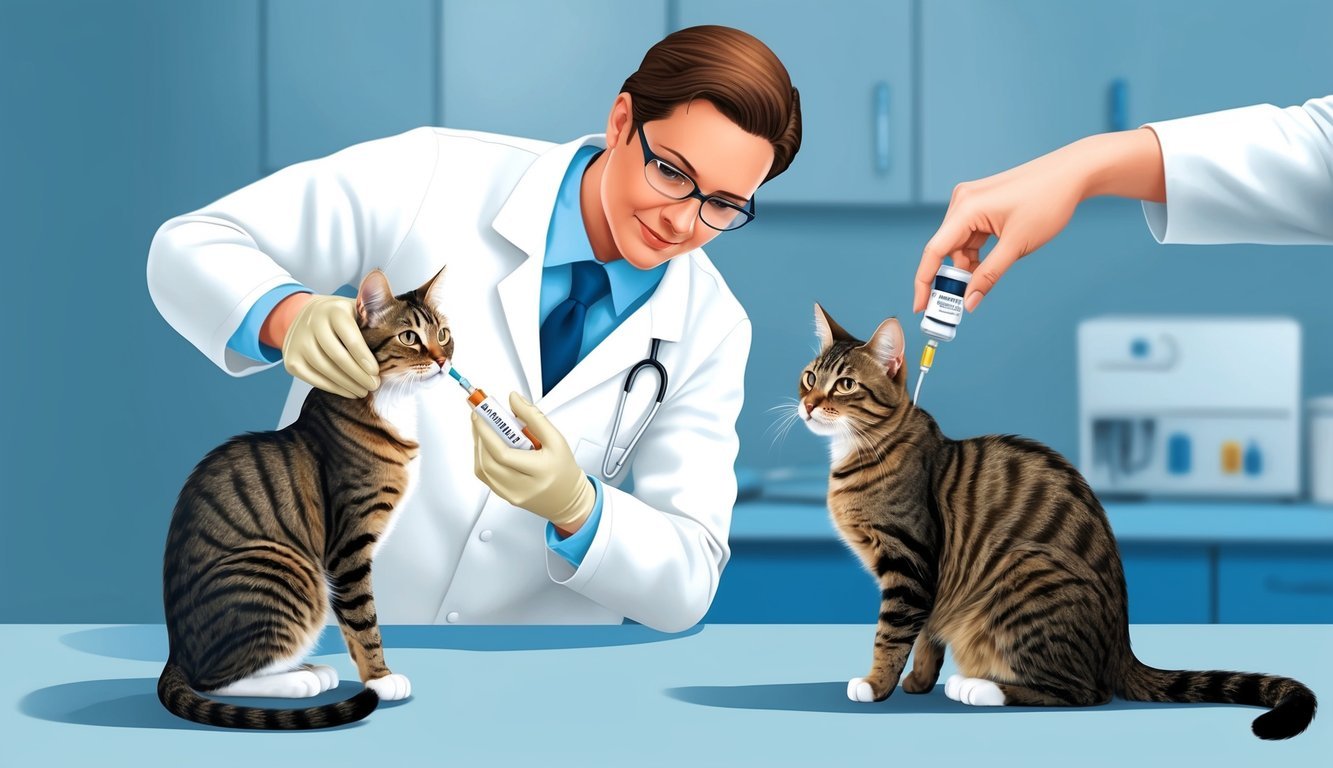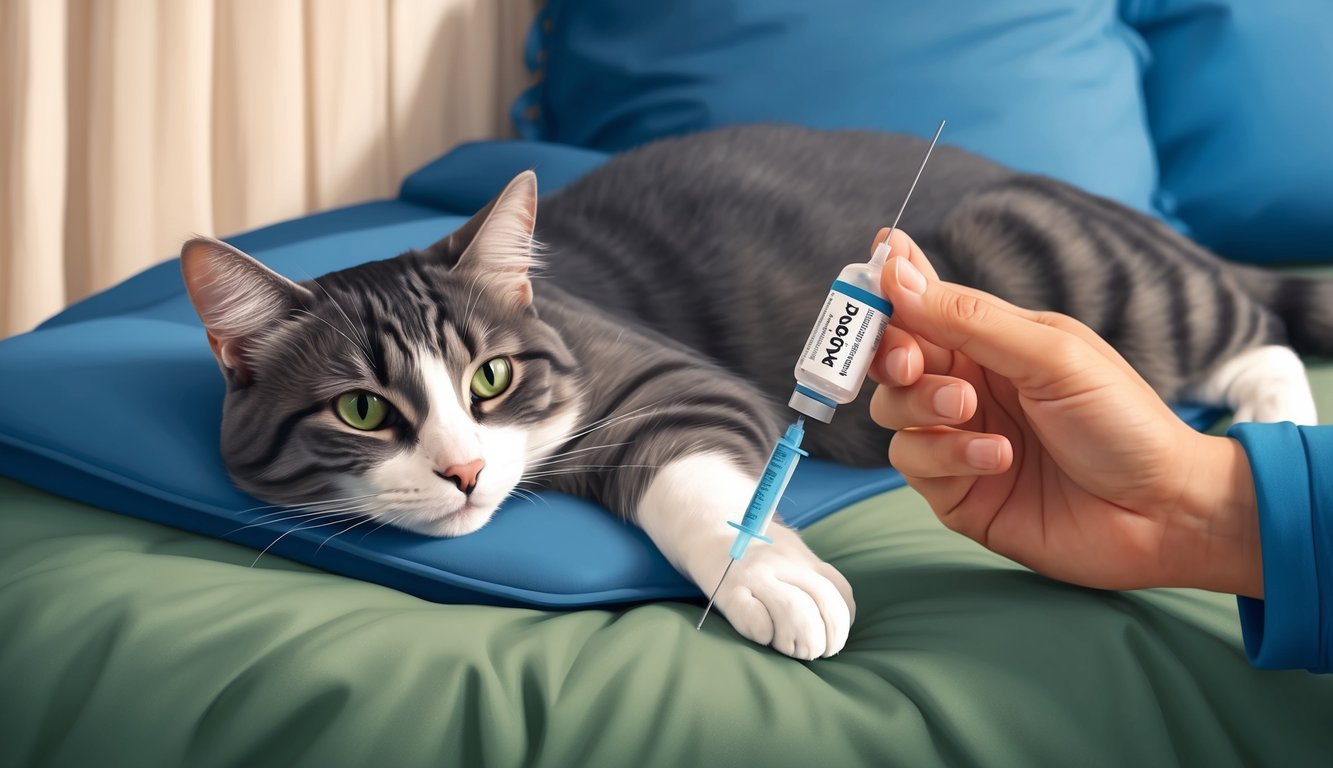Depo-Medrol is a corticosteroid often used in veterinary medicine to address various health issues in cats, particularly those related to inflammation and allergies.
This long-acting steroid injection can help manage conditions that may affect your feline friend’s quality of life, providing relief from discomfort and improving their overall well-being.
Understanding how Depo-Medrol works and what it entails is key to ensuring your cat’s health.
As a pet owner, it’s vital to be aware of both the benefits and potential side effects associated with this medication.
It’s important to work closely with your veterinarian to tailor the treatment to your cat’s specific needs.
By doing so, you can help ensure that your furry companion receives the right care for their unique situation.
With the right knowledge about Depo-Medrol, you can navigate your cat’s treatment more effectively and make informed decisions about their health care.
From administration methods to monitoring health, gaining insights into this medication can empower you as a responsible pet owner.
Key Takeaways
- Depo-Medrol is effective for managing inflammation and allergic reactions in cats.
- Familiarizing yourself with its potential side effects is crucial for your cat’s health.
- Collaborating with your veterinarian ensures your cat receives optimal treatment.
Understanding Depo-Medrol
Depo-Medrol is a popular medication among veterinarians for treating various conditions in cats.
It primarily works as a powerful anti-inflammatory drug and can address several health issues effectively.
What Is Depo-Medrol?
Depo-Medrol is the brand name for methylprednisolone, a synthetic glucocorticoid steroid.
Vets use this medication for various conditions, including allergic reactions, arthritis, and skin problems.
Administered via intramuscular injection, Depo-Medrol offers long-lasting relief, typically maintaining effects for about 2-3 weeks.
Your veterinarian will determine the appropriate dosage based on your cat’s specific needs and health conditions.
Active Ingredients
The active ingredient in Depo-Medrol is methylprednisolone acetate.
This compound is known for its potent anti-inflammatory effects.
It binds to glucocorticoid receptors in the body, helping to modulate the immune system and reduce tissue inflammation.
In terms of formulation, Depo-Medrol typically comes in a white to off-white suspension.
Zoetis is the manufacturer behind this widely used medication.
Understanding these components helps you grasp how Depo-Medrol may benefit your cat’s health.
Corticosteroids and their Uses
Corticosteroids, like Depo-Medrol, are common in veterinary medicine for their ability to tackle inflammation.
These drugs can treat a range of issues from allergies to autoimmune diseases effectively.
For cats, corticosteroids are often a go-to option when seeking relief from chronic conditions.
Vets may prescribe them to manage asthma, skin allergies, and various inflammatory disorders.
It’s essential to balance the benefits of using corticosteroids with their potential side effects.
Regular consultations with your veterinarian can help monitor your cat’s health while using Depo-Medrol.
Always follow their advice regarding dosage and administration.
Depo-Medrol as a Treatment for Cats

Depo-Medrol is frequently used to manage various inflammatory conditions in cats.
As an effective corticosteroid, it alleviates symptoms related to arthritis, asthma, and allergic dermatitis.
Understanding its uses, benefits, and dosages can greatly help in deciding whether this treatment is right for your cat.
Conditions Treated
Depo-Medrol is beneficial for several conditions in cats.
It effectively addresses:
-
Arthritis: This condition causes joint pain and inflammation. Depo-Medrol can reduce these symptoms, leading to improved mobility.
-
Asthma: If your cat suffers from asthma, this medication can help manage airway inflammation and reduce attacks.
-
Allergic Dermatitis: Skin allergies often lead to itching and discomfort. Depo-Medrol helps minimize these allergic reactions and brings relief.
Its ability to suppress the immune response allows it to tackle a variety of issues, making it a versatile choice for managing chronic conditions.
Benefits of Depo-Medrol
The use of Depo-Medrol offers several notable advantages:
-
Effective Relief: You’ll find it effective in calming inflammation quickly, contributing to your cat’s comfort.
-
Convenience of Injections: Administering it via injection may be easier for some cat owners compared to daily oral medications.
-
Long-lasting Effects: The medication’s effects can last for several weeks, which means fewer vet visits and less disruption to your cat’s routine.
While the benefits are significant, monitoring for potential side effects is essential.
Always discuss your cat’s health history with your veterinarian before starting treatment.
Understanding Dosages
Dosages of Depo-Medrol can vary based on your cat’s specific needs.
The standard intramuscular (IM) dose is typically between 10 mg and 20 mg, depending on the condition being treated.
Factors such as your cat’s weight, age, and general health will influence the appropriate dosage.
It’s crucial to follow your veterinarian’s guidance for injections.
They may adjust the dosage over time or recommend a specific treatment plan aligned with your cat’s response to the medication.
Regular follow-ups will help ensure your cat remains stable and comfortable while on Depo-Medrol.
Method of Administration

Administering Depo-Medrol to your cat requires specific techniques tailored to its injectable form.
Understanding the methods available ensures effective treatment while minimizing discomfort for your pet.
Injectable Form and Techniques
Depo-Medrol comes as an injectable suspension, which means it’s designed to be delivered through a syringe.
Before administration, shake the vial gently to mix the contents thoroughly.
This ensures an even distribution of the medication.
When preparing to inject, choose a suitable syringe and needle size, typically a 1 to 3 mL syringe with a 22-25 gauge needle for cats.
Maintain a sterile environment to reduce infection risks.
You’ll want to carefully draw the correct dose into the syringe and ensure no air bubbles remain before proceeding.
Intramuscular vs. Intravenous Injection
Intramuscular (IM) injection is the most common method for administering Depo-Medrol in cats.
You will typically inject the medication into the muscle, often in the thigh or shoulder area.
This method allows for a slower release of the medication into the bloodstream, offering a prolonged therapeutic effect.
On the other hand, intravenous (IV) injection delivers the medication directly into the bloodstream, which can lead to quicker effects.
However, this method requires more skill for proper placement and is generally recommended for emergency situations or when immediate results are necessary.
Intrasynovial Injection
Intrasynovial injections involve delivering Depo-Medrol directly into the synovial space of a joint.
This technique targets localized inflammation, especially in cases of arthritis or joint pain.
To perform this injection, it’s crucial to use proper sterile techniques and anatomical landmarks to avoid complications.
This method can provide significant relief by concentrating the medication exactly where it’s needed most, making it particularly effective in managing joint disorders in cats.
Potential Side Effects and Risks

When considering Depo-Medrol for your cat, it’s important to be aware of potential side effects and risks.
This medication can have both short-term and long-term impacts, which require careful monitoring.
Understanding these effects will help you make informed choices for your pet’s health.
Short-term Side Effects
In the initial phase after administering Depo-Medrol, your cat may experience several short-term side effects.
Common issues include increased thirst and urination.
You might notice your cat drinking more water than usual, leading to more frequent trips to the litter box.
Digestive upset is also a common concern.
This can manifest as diarrhea, vomiting, or a decreased appetite.
Watch for signs of gastrointestinal distress like lethargy or sudden weight loss.
If you observe these symptoms, contact your veterinarian to discuss possible adjustments or alternative treatments.
Monitoring these short-term effects can help manage your cat’s comfort during treatment.
Monitoring for Long-term Effects
Long-term use of Depo-Medrol can lead to more serious health issues.
You should be vigilant about symptoms such as excessive weight gain or changes in behavior.
This medication can affect metabolism and the risk of diabetes.
In addition to weight changes, some cats may develop ulcers or other gastrointestinal problems if treated with steroids over an extended period.
Regular veterinary check-ups are crucial for managing these risks.
Keeping an eye on your cat’s health and communicating any changes to your veterinarian will help ensure that the benefits of the medication outweigh the potential risks.
Recognizing Overdose Symptoms
An overdose of Depo-Medrol can pose serious health hazards for your cat.
Symptoms of overdose may include extreme lethargy, significant changes in appetite, or severe vomiting.
Be alert to any drastic increase in thirst or urination that doesn’t seem typical.
If you notice your cat exhibiting these signs, seek immediate veterinary assistance.
Quick action can make a significant difference in your pet’s recovery.
Comparative Analysis

When considering Depo-Medrol for your cat, it’s essential to look at how it compares to other treatments.
Understanding the differences between corticosteroids and NSAIDs, as well as exploring alternatives for specific conditions, will help you make an informed decision.
Depo-Medrol vs. Other Treatments
Depo-Medrol is a glucocorticoid steroid that provides effective relief for inflammatory and allergic conditions in cats.
It may be compared to various treatments based on factors such as efficacy, side effects, and duration of action.
-
Efficacy: Depo-Medrol can be particularly effective for skin allergies, asthma, and autoimmune disorders. Other treatments, like prednisone, may also work but could require more frequent administration.
-
Side Effects: Corticosteroids like Depo-Medrol come with potential side effects, such as increased thirst and urination. Choosing an injectable form can mitigate the need for daily pills, making administration easier.
-
Duration of Action: Depo-Medrol offers longer-lasting effects compared to other medications, often providing relief for two to three weeks per injection. Short-acting options may necessitate more frequent dosing, which can be challenging.
Corticosteroids vs. NSAIDs
Corticosteroids and NSAIDs serve different purposes in managing your cat’s health.
-
Corticosteroids are powerful anti-inflammatories, ideal for severe allergic reactions or autoimmune diseases. They suppress the immune response effectively but can lead to side effects with prolonged use.
-
NSAIDs, on the other hand, are generally used for pain relief and inflammation. They are often favored for osteoarthritis but may not suppress the immune response as effectively as corticosteroids.
Both categories can be beneficial, but the choice will rely on your cat’s specific condition and treatment goals.
Alternatives for Cats with Specific Conditions
For certain health issues, alternatives to Depo-Medrol might be more appropriate.
-
Allergies: If your cat suffers from mild allergies, antihistamines or fatty acid supplements could provide relief without the side effects of corticosteroids.
-
Chronic Pain: For chronic pain management, NSAIDs like meloxicam might be suitable, especially for older cats with arthritis.
-
Asthma: In cases of feline asthma, inhaled medications can focus on reducing inflammation with fewer systemic effects than steroids.
By considering these alternatives, you can tailor the treatment plan to better suit your cat’s unique needs.
Understanding Interactions and Contraindications

When considering Depo-Medrol for your cat, understanding its interactions with other drugs and existing health issues is crucial.
It helps ensure your pet receives safe and effective treatment tailored to their needs.
Drug Interactions
Depo-Medrol can interact with various medications, which may alter its effectiveness or increase the risk of side effects.
Some notable interactions include:
- Non-steroidal anti-inflammatory drugs (NSAIDs): NSAIDs can increase the risk of gastrointestinal ulcers.
- Anticoagulants: Corticosteroids may alter the effectiveness of blood thinners.
- Vaccines: Corticosteroids can suppress the immune response, potentially affecting how well your cat responds to vaccinations.
Always discuss your cat’s current medications with your veterinarian before starting Depo-Medrol to identify any possible interactions that could pose a risk.
Health Conditions and Contraindications
Certain health conditions make Depo-Medrol use risky.
Key contraindications include:
- Diabetes Mellitus: Corticosteroids can raise blood sugar levels, complicating diabetes management.
- Congestive Heart Failure: Increased sodium retention can worsen heart failure symptoms.
- Kidney Problems: Use of Depo-Medrol can exacerbate existing kidney issues, leading to further health complications.
If your cat has any of these conditions, consult your veterinarian for alternative treatments or adjustments to the medication plan.
Monitoring your cat’s health during treatment is essential for their safety.
Managing and Monitoring Health
Taking care of your cat after receiving Depo-Medrol involves specific aftercare practices and regular veterinary visits.
Keeping an eye on their health is crucial for ensuring effective treatment, especially for conditions like inflammatory bowel disease and immune-mediated diseases.
Aftercare Following Injection
After your cat receives a Depo-Medrol injection, it’s important to monitor their behavior and health closely.
You may notice some side effects, such as increased thirst or urination.
Make sure to provide plenty of fresh water.
Watch for signs of adverse reactions, including lethargy or increased appetite.
If your cat displays unusual symptoms, contact your veterinarian immediately.
Maintain a comfortable environment to aid in healing.
Monitor any existing wounds or inflammation, ensuring they remain clean.
Regularly inspect affected areas to help gauge improvement or the need for follow-up care.
Regular Check-Ups and Testing
Regular veterinary check-ups are vital after your cat receives Depo-Medrol.
Your veterinarian will likely recommend follow-ups every 2-3 weeks, especially if your cat is being treated for conditions like high blood pressure or immune-related diseases.
During visits, your vet may perform blood tests to monitor for potential side effects, such as changes in blood sugar or liver function.
It is important to track your cat’s progress over time.
Discuss any changes you observe at home.
This can include behavior shifts, appetite changes, or issues with wound healing.
Your input helps the veterinarian tailor the treatment plan effectively, ensuring the best care for your cat.
Owner Considerations and Responsibilities

When managing your cat’s health with Depo-Medrol, you play a crucial role in ensuring safety and effectiveness.
Understanding the medication, maintaining open communication with your veterinarian, and creating a suitable environment for your cat are essential elements to consider.
Educating Yourself on Depo-Medrol
Familiarize yourself with how Depo-Medrol works and its potential effects on your cat.
This medication is often prescribed to manage allergies and inflammation but can lead to some side effects.
Monitor for signs such as increased thirst, increased appetite, and lethargy after administration.
These symptoms can indicate how your cat is reacting to the treatment.
If you notice excessive panting or other unusual behaviors, you should consult your veterinarian immediately.
Knowing what to expect will help you maintain a watchful eye on your cat’s health.
Communication with Your Veterinarian
Open lines of communication with your veterinarian are vital.
Always share any concerns or observations regarding your cat’s behavior or health changes after starting Depo-Medrol.
Discuss the treatment plan thoroughly, including dosage adjustments, appointment schedules, and follow-up care.
Use your vet as a resource.
Ask about potential side effects and what symptoms warrant an emergency visit.
If you experience any unexpected reactions, such as lethargy or panting, don’t hesitate to reach out for guidance.
Keeping your veterinarian informed will contribute significantly to your cat’s well-being.
Creating a Safe Environment for Your Cat
Creating a comfortable and safe space for your cat is essential, especially when they are on medication.
Ensure that your home is free from hazards, like choking risks or toxic plants.
Provide a cozy place where your cat can rest and recover.
Monitor their behavior, especially during the initial days after receiving the injection.
If your cat appears lethargic, encourage hydration by providing fresh water.
Remember, if you notice signs of distress or changes in eating habits, it’s crucial to contact your veterinarian.
Establishing a safe environment can aid recovery and enhance your cat’s overall comfort during treatment.
Frequently Asked Questions

You may have some questions about Depo-Medrol and its use in cats.
Below are common inquiries that pet owners typically have regarding potential side effects, dosage, duration of effects, and cost.
What are the potential side effects of using Depo-Medrol in felines?
Some potential side effects of Depo-Medrol include increased thirst and urination, changes in appetite, and possible digestive issues.
Monitor your cat for any unusual behavior or symptoms after administration.
Long-term use may lead to more serious side effects, such as diabetes or immune suppression.
How long will the effects of Depo-Medrol last in my cat?
The effects of Depo-Medrol can last anywhere from a few days to several weeks.
It varies depending on the individual cat and the condition being treated.
Regular check-ups with your veterinarian can help determine how well your cat is responding to the treatment.
Can you provide the proper dosage of Depo-Medrol for cats?
Dosage for Depo-Medrol can vary based on your cat’s specific condition, size, and overall health.
It is crucial to follow your veterinarian’s recommendations for the most accurate dosage.
Never administer this medication without proper veterinary guidance.
Where can I find the dosage chart for administering Depo-Medrol to cats?
You can typically find dosage charts in your veterinarian’s office or through trusted veterinary websites.
These charts provide general guidelines but should not replace professional advice tailored to your cat’s needs.
What is the cost range for Depo-Medrol treatment in cats?
The cost of Depo-Medrol treatment can vary based on factors such as your location and the veterinary clinic.
On average, you might expect to pay anywhere from $30 to $150 per injection.
It’s best to consult with your vet for precise pricing.
How do steroid injections like Depo-Medrol benefit cats with allergies?
Steroid injections like Depo-Medrol can significantly reduce inflammation and allergic reactions in cats.
They work by suppressing the immune response, which helps alleviate symptoms like itching and discomfort.
Your vet can help determine if this treatment is appropriate for your cat’s specific allergy issues.

